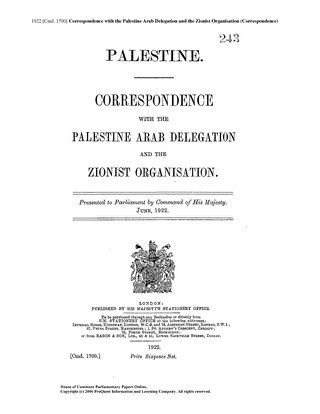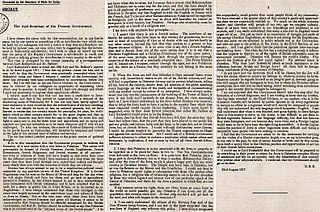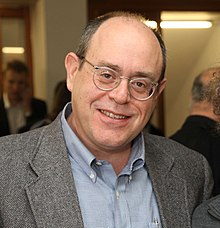
The Balfour Declaration was a public statement issued by the British Government in 1917 during the First World War announcing its support for the establishment of a "national home for the Jewish people" in Palestine, then an Ottoman region with a small minority Jewish population. The declaration was contained in a letter dated 2 November 1917 from the United Kingdom's Foreign Secretary Arthur Balfour to Lord Rothschild, a leader of the British Jewish community, for transmission to the Zionist Federation of Great Britain and Ireland. The text of the declaration was published in the press on 9 November 1917.
The Israeli Declaration of Independence, formally the Declaration of the Establishment of the State of Israel, was proclaimed on 14 May 1948 by David Ben-Gurion, the Executive Head of the World Zionist Organization, Chairman of the Jewish Agency for Palestine, and later first Prime Minister of Israel. It declared the establishment of a Jewish state in Eretz-Israel, to be known as the State of Israel, which would come into effect on termination of the British Mandate at midnight that day. The event is celebrated annually in Israel as Independence Day, a national holiday on 5 Iyar of every year according to the Hebrew calendar.

Mordecai Menahem Kaplan was an American Modern Orthodox rabbi, writer, Jewish educator, professor, theologian, philosopher, activist, and religious leader who founded the Reconstructionist movement of Judaism along with his son-in-law Ira Eisenstein. He has been described as a "towering figure" in the recent history of Judaism for his influential work in adapting it to modern society, contending that Judaism should be a unifying and creative force by stressing the cultural and historical character of the religion as well as theological doctrine.

Reconstructionist Judaism is a Jewish movement based on the concepts developed by Rabbi Mordecai Kaplan (1881–1983) that views Judaism as a progressively evolving civilization rather than just a religion. The movement originated as a semi-organized stream within Conservative Judaism, developed between the late 1920s and the 1940s before seceding in 1955, and established a rabbinical college in 1967. Reconstructionist Judaism is recognized by many scholars as one of the five major streams of Judaism in America alongside Orthodox, Conservative, Reform, and Humanistic.
Antisemitism and the New Testament is the discussion of how some Christians' views of Judaism in the New Testament have contributed to discrimination against Jewish people throughout history and in the present day.

Zionism is an ethnocultural nationalist movement that emerged in Europe in the late 19th century and aimed for the establishment of a Jewish state through the colonization of a land outside Europe. With the rejection of alternative proposals for a Jewish state, it focused on the establishment of a homeland for the Jewish people in Palestine, a region corresponding to the Land of Israel in Judaism, and of central importance in Jewish history. Zionists wanted to create a Jewish state in Palestine with as much land, as many Jews, and as few Palestinian Arabs as possible. Following the establishment of the State of Israel in 1948, Zionism became Israel's national or state ideology.

Chaim Azriel Weizmann was a Russian-born biochemist, Zionist leader and Israeli statesman who served as president of the Zionist Organization and later as the first president of Israel. He was elected on 16 February 1949, and served until his death in 1952. Weizmann was instrumental in obtaining the Balfour Declaration of 1917 and convincing the United States government to recognize the newly formed State of Israel in 1948.

Asher Zvi Hirsch Ginsberg, primarily known by his Hebrew name and pen name Ahad Ha'am, was a Hebrew journalist and essayist, and one of the foremost pre-state Zionist thinkers. He is known as the founder of cultural Zionism. With his vision of a Jewish "spiritual center" in Eretz Israel, his views regarding the purpose of a Jewish state contrasted with those of prominent figures within the Zionist movement such as Theodor Herzl, the founder of political Zionism. Unlike Herzl, Ahad Ha'am strived for "a Jewish state and not merely a state of Jews".

The Churchill White Paper of 3 June 1922 was drafted at the request of Winston Churchill, then Secretary of State for the Colonies, partly in response to the 1921 Jaffa Riots. The official name of the document was Palestine: Correspondence with the Palestine Arab Delegation and the Zionist Organisation. The white paper was made up of nine documents and "Churchill's memorandum" was an enclosure to document number 5. While maintaining Britain's commitment to the Balfour Declaration and its promise of a Jewish national home in Mandatory Palestine, the paper emphasized that the establishment of a national home would not impose a Jewish nationality on the Arab inhabitants of Palestine. To reduce tensions between the Arabs and Jews in Palestine the paper called for a limitation of Jewish immigration to the economic capacity of the country to absorb new arrivals. This limitation was considered a great setback to many in the Zionist movement, though it acknowledged that the Jews should be able to increase their numbers through immigration rather than sufferance.

William Eugene Blackstone was an American evangelist and Christian Zionist. He was the author of the Blackstone Memorial (1891), a petition which called upon the United States to actively return the Holy Land to the Jewish people. Blackstone was influenced by Dwight Lyman Moody, James H. Brookes, and John Nelson Darby.
The Gathering of Israel, or the Ingathering of the Jewish diaspora, is the biblical promise of Deuteronomy 30:1–5, made by Moses to the Israelites prior to their entry into the Land of Israel.

Messianism in Chabad refers to the core belief within the Chabad-Lubavitch community—a prominent group within Hasidic Judaism—regarding the Jewish messiah. Central to this belief is the conviction that Rabbi Menachem Mendel Schneerson, the seventh Rebbe of the Chabad-Lubavitch dynasty, is the awaited Messiah who is leading the Jewish people into the Messianic era.
In world politics, Jewish state is a characterization of Israel as the nation-state and sovereign homeland for the Jewish people.
Jewish deicide is the theological position and antisemitic trope that the Jews as a people are collectively responsible for the killing of Jesus, even through the successive generations following his death. The notion arose in early Christianity, and features in the writings of Justin Martyr and Melito of Sardis as early as the 2nd century. The Biblical passage Matthew 27:24–25 has been seen as giving voice to the charge of Jewish deicide as well.
Jonathan S. Tobin is an American journalist. He is editor in chief of the Jewish News Syndicate (JNS).

Anti-Zionism is opposition to Zionism. Although anti-Zionism is a heterogeneous phenomenon, all its proponents agree that the creation of the modern State of Israel, and the movement to create a sovereign Jewish state in the region of Palestine—a region partly coinciding with the biblical Land of Israel—was flawed or unjust in some way.
This timeline of anti-Zionism chronicles the history of anti-Zionism, including events in the history of anti-Zionist thought.

Canaanism was a cultural and ideological movement founded in 1939, reaching its peak among the Jews of Mandatory Palestine during the 1940s. It has had a significant effect on the course of Israeli art, literature and spiritual and political thought. Its adherents were called Canaanites. The movement's original name was the Council for the Coalition of Hebrew Youth or less formally, the Young Hebrews; Canaanism was originally a pejorative term. It grew out of Revisionist Zionism and had roots in European extreme right-wing movements, particularly Italian fascism. Most of its members were part of the Irgun or Lehi.
Ronald Sanders was an American journalist and writer.

Moshe Sharon is an Israeli historian of Islam.












